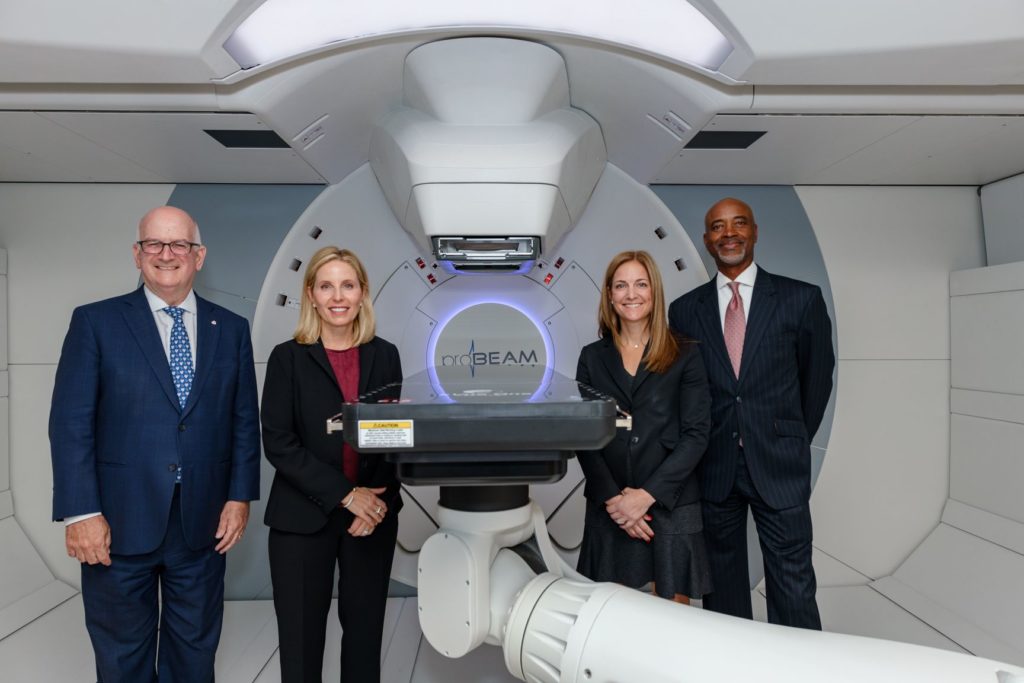
The Penn Medicine Virtua Health Proton Therapy Center in Voorhees has marked a significant milestone: its first year of operation.
The facility – the only one of its kind in South Jersey – has provided advanced cancer treatment to more than 150 patients, surpassing initial projections by 14%.
Proton therapy is a non-invasive treatment that uses a beam of high-energy protons to eliminate cancer cells with pinpoint accuracy. Unlike conventional radiation therapy, which can affect healthy tissues surrounding a tumor, proton therapy minimizes the risk by precisely targeting only cancerous cells. That makes it particularly beneficial for patients with tumors in sensitive locations or those who want to minimize long-term side effects.
Proton therapy is a highly precise form of radiation therapy that targets cancerous tumors while sparing surrounding healthy tissue. The treatment has given new hope to many patients, particularly those with tumors located near sensitive areas such as the brain, heart, and spine, where traditional radiation might pose greater risks.
The Proton Therapy Center hosted a reunion event om Sept. 10 for patients and their care teams at Virtua’s Barry D. Brown Health Education Center in the township. The event not only celebrated the center’s first year, but was an opportunity for patients to reconnect with doctors and staff who treated them.
“It’s incredibly gratifying to have helped so many people in our first year,” said Stephanie Fendrick, executive vice president and chief strategy officer at Virtua Health, South Jersey’s largest health system. “This milestone is a testament to the dedication and expertise of our team and the strong partnership between Virtua Health and Penn Medicine.”
Among the patients treated in the past year are individuals with a wide range of cancers, including prostate, brain, breast, lung, liver, and esophageal. The center also has a unique feature, a proton therapy nurse coordinator who guides patients through the complexities of treatment.
“Being able to receive this world-class treatment close to home makes a huge difference to patients and their families, as the therapy is typically given five days a week for five to eight weeks,” explained Dr. Graeme Williams, the therapy center’s medical director.
One of the center’s early patients, Michael Pratt of Glassboro, shared his experience with proton therapy to treat an aggressive form of prostate cancer. Referred by his doctor at Penn Medicine, Pratt was relieved to find a facility closer to home, sparing him the daily commute to Philadelphia.
“The team there was wonderful,” he said. Since completing his treatment last October, there are no signs of Pratt’s cancer returning.
For many patients, proton therapy represents not just a treatment, but a lifeline. Kyersten Corda, a young breast cancer survivor from Marlton, was just 32 when she was diagnosed with cancer despite initial tests that showed no signs of it. Corda chose to have a suspicious lump removed, only to discover that the cancer had spread to her lymph nodes.
After a double mastectomy and chemotherapy, Corda got proton therapy at the center to target any remaining cancerous cells. Dr. Catherine Kim, Corda’s radiation oncologist, emphasized the importance of proton therapy in her case.
“It was important for Kyersten to receive proton therapy, because traditional radiation could have exposed her heart and lung to unnecessary radiation,” Kim noted.
But getting proton therapy is not without its challenges. Insurance coverage can be a significant barrier, as Corda discovered when her initial request for coverage was denied. Kim and Corda worked tirelessly to advocate for the treatment, ultimately securing approval for insurance by demonstrating the benefits of proton therapy over traditional radiation.
“The physician needs to be the patient’s champion,” Kim observed. “It’s a lot of work, but if you feel strongly about the need for proton therapy, it has to be done.”
As the Penn Medicine Virtua Health Proton Therapy Center enters its second year, the team remains committed to expanding its access. With a 90-ton cyclotron at its core, the center is equipped to continue advanced cancer care.
“All of us look forward to doing even more in the coming years, to help people live longer, healthier lives after a cancer diagnosis,” Williams said.
For more information about the Penn Medicine Virtua Health Proton Therapy Center, visit www.virtua.org/pennproton or call (888) 847-8823.







